A Peek into Thailand’s Hottest Star’s World: 10 Facts You Should Know About Freen
Get an exclusive peek into the world of Freen Sarocha: uncover 10 facts ...
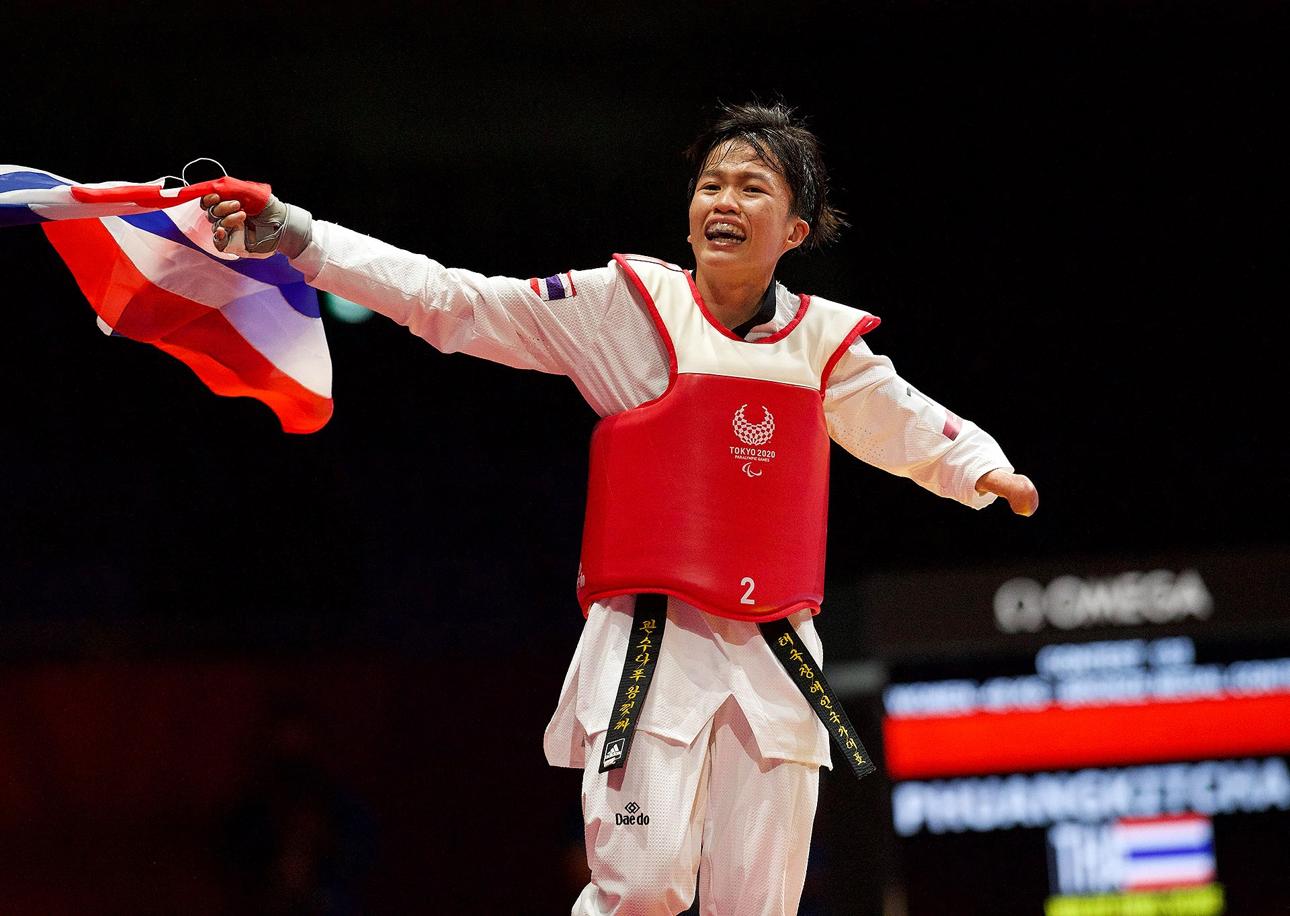
This story first appeared in Koktail Magazine issue 1.
Photos courtesy of the Paralympic Committee of Thailand, Singha Corporation and the Taekwondo Sports Association for the Thai Disabled.
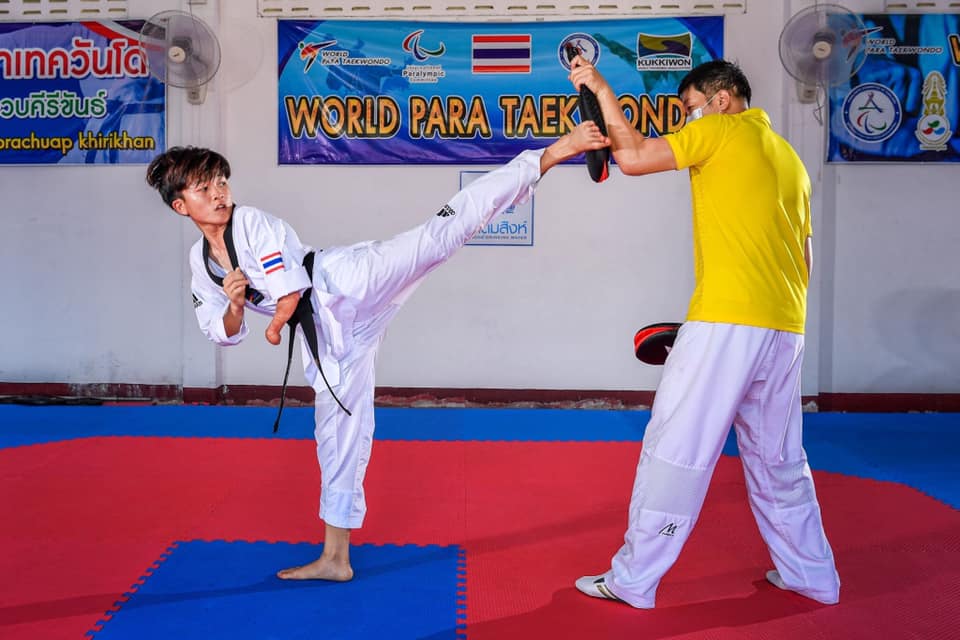
Khwansuda throws a well-aimed kick during training
At home in the humid forests of Prachuap Khiri Khan, without running water or electricity, two-year-old Khwansuda “Khwan” Phuangkitcha lay crying in her hammock while her parents were out working as farmhands. Afraid that her baby sister was being bitten by mosquitos, Khwan’s four-year-old sister rushed over with a lantern. But the oil spilled and lit the blanket, setting half of Khwan’s body aflame. Her left hand had to be amputated to save her from infection. The rest of her arm was permanently scarred with burn marks.
Almost two decades later Khwan fought her way to the bronze medal in para taekwondo at the Tokyo 2020 Paralympics. “Before, good things didn’t really happen in my life,” the young woman says, “but when I won that medal, it was like a dream.”
Yet her fight in life is far from over. None of Khwan’s Paralympics matches were broadcast live in her home country and she and her fellow medalists were entitled to less prize money and little welfare benefits, when compared to their able-bodied Olympian counterparts.
Khwan was one of the 76 Thai Paralympians competing at the coronavirus-delayed 2020 Games in Tokyo, held in late August 2021. Thailand won five gold, five silver and eight bronze medals, ranking 25th in the medals table as the best-performing ASEAN nation.
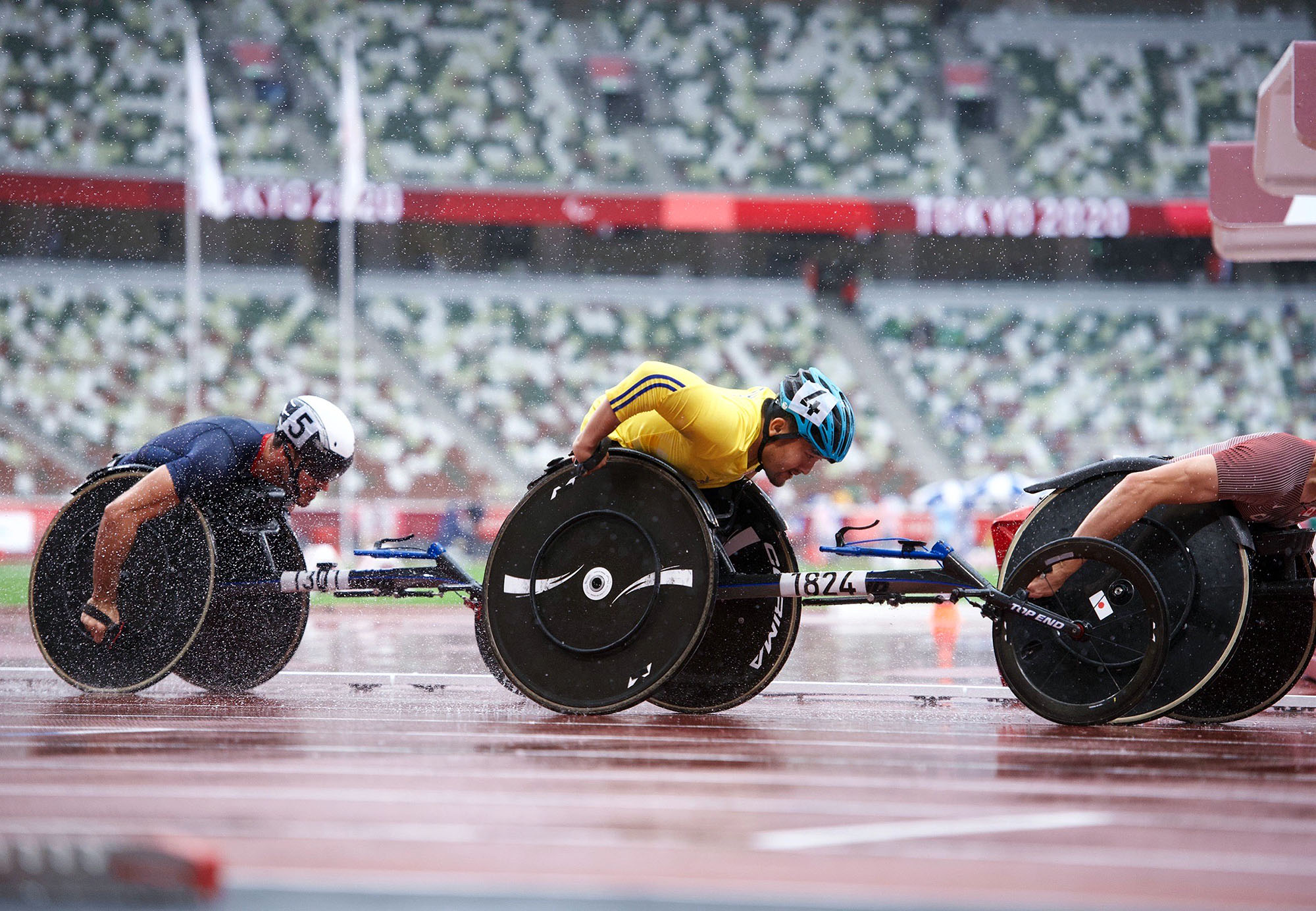
Wheelchair racing earned Thailand 10 medals in the Tokyo 2020 Paralympics
In a country with notoriously little rights or systematic support for the disabled, the Paralympians’ victories are nothing short of spectacular. At the Olympics just a few weeks earlier, Thailand won just one gold and one bronze medal, ranking 59th.
“I don’t want to compare but we were so successful because we practised every day for almost four years. With Covid raging, our training climaxed because no one went home. Everyone lived at the sealed-off facilities,” says Maitree Kongruang, secretary-general of the Paralympic Thai Committee. Previous Paralympics athletes would only get together for six months before the Paralympics. However, with the help of the Sports Authority of Thailand’s Road to Tokyo programme, this time around the athletes lived and breathed their sport seven days a week for four years at training camps scattered throughout the country. “Everyone was in peak condition last year but the Games were delayed. The silver lining was that our athletes got even more time to prepare in facilities that they basically had to themselves because they were closed to the public,” Maitree adds.
The big stars of wheelchair racing, swimming, shooting and table tennis trained at the 80th Birthday Stadium in Nakhon Ratchasima. Pongsakorn Paeyo would go on to win three golds in T53 wheelchair racing, while Athiwat Paeng-Nuea brought home a gold and silver in T54. Veteran racer Prawat Wahoram took silver, Putharet Khongrak won two bronzes and Saichon Konjen a bronze.
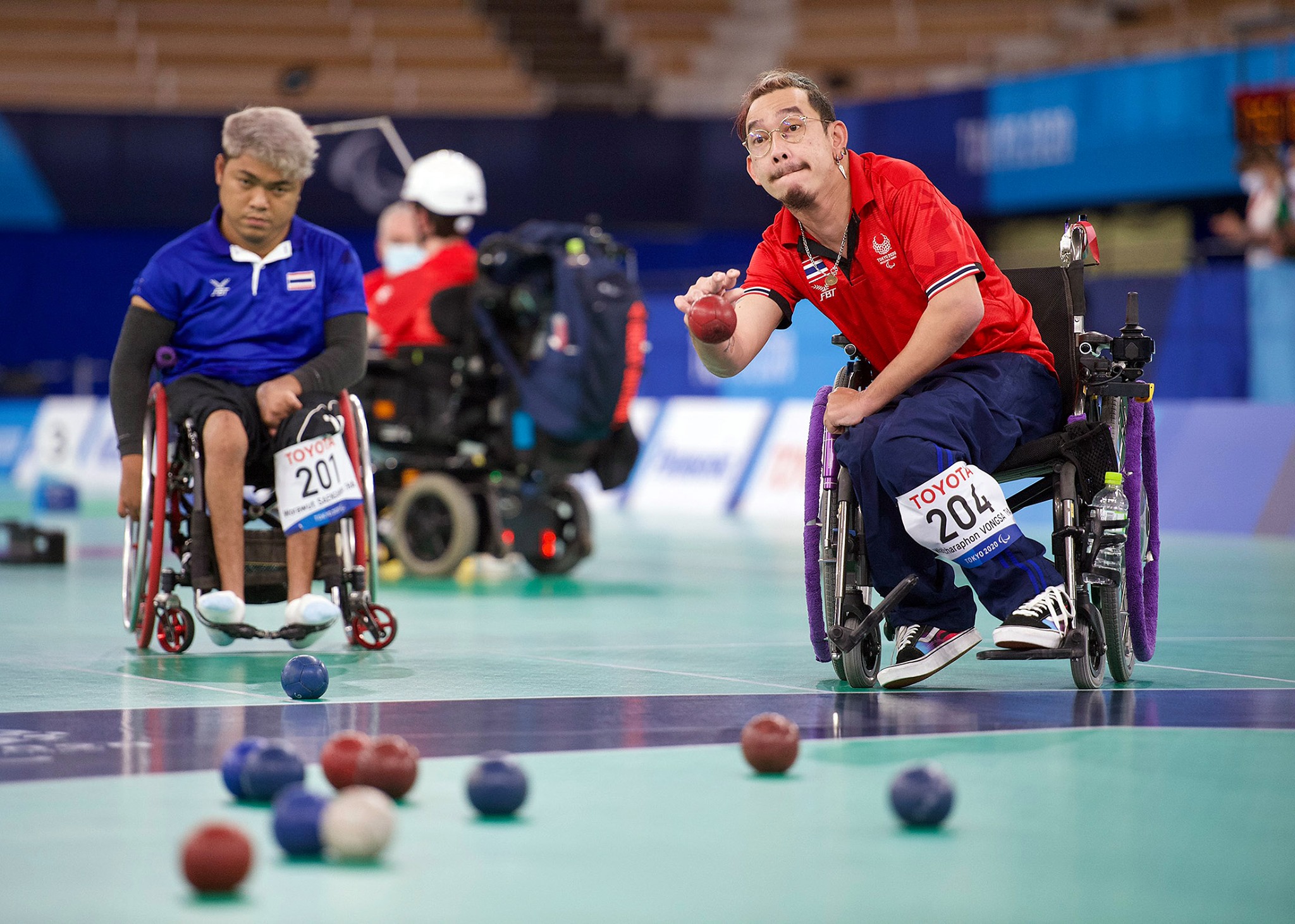
Watcharaphon Vongsa aims a ball to win in boccia
Thailand is home to some of the world’s best boccia players. Boccia is a ball game similar to bowls and at the 2020 Paralympics, the Thai boccia team, led by Watcharaphon Vongsa, won gold for the third consecutive time, while Pornchok Larpyen won silver in his individual class. The boccia athletes, who have varying levels of disability, trained at the Cerebral Palsy Sports Association of Thailand’s specialised boccia training centre in Bangkok.
Saysunee Jana, Thailand’s first female gold Paralympian, added a bronze medal in epee wheelchair fencing. Para table tennis players snagged two bronzes, one for Rungroj Thainiyom in Class 6 men’s singles and one for Yuttajak Glinbancheun and Anurak Laowong in the Class 3 team competition. Elsewhere, in the newly-added sport of para badminton, rising star Sujirat Pookham won a silver in women’s singles and bronze with Amnouy Wetwithan in the doubles.
Khwan, the only Thai entry in the new sport of para taekwondo, trained apart from the other athletes in Prachuap Khiri Khan down south, sometimes sparring on the beach in order to avoid closed-air spaces. “When my mask slipped due to sweat, I would be scared of getting Covid,” she says. Since her childhood accident, her life has been challenging to say the least. Tragically, her mother was paralysed after being hit by a car and soon after, her sister was assaulted and murdered by local drug addicts at the age of 12. Her body was dumped in a canal near the family home.
It was then that Khwan’s father decided to send her to a school 40 kilometres away. The young fighter recalls, “I didn’t have confidence in myself. I would only wear long-sleeved shirts everywhere. I was scared all the time.” But a different future for the rural teen took shape at the new school in the form of Yeong Kyun Shin, a Korean taekwondo coach who was introducing an adapted version of the sport for athletes with impairments.
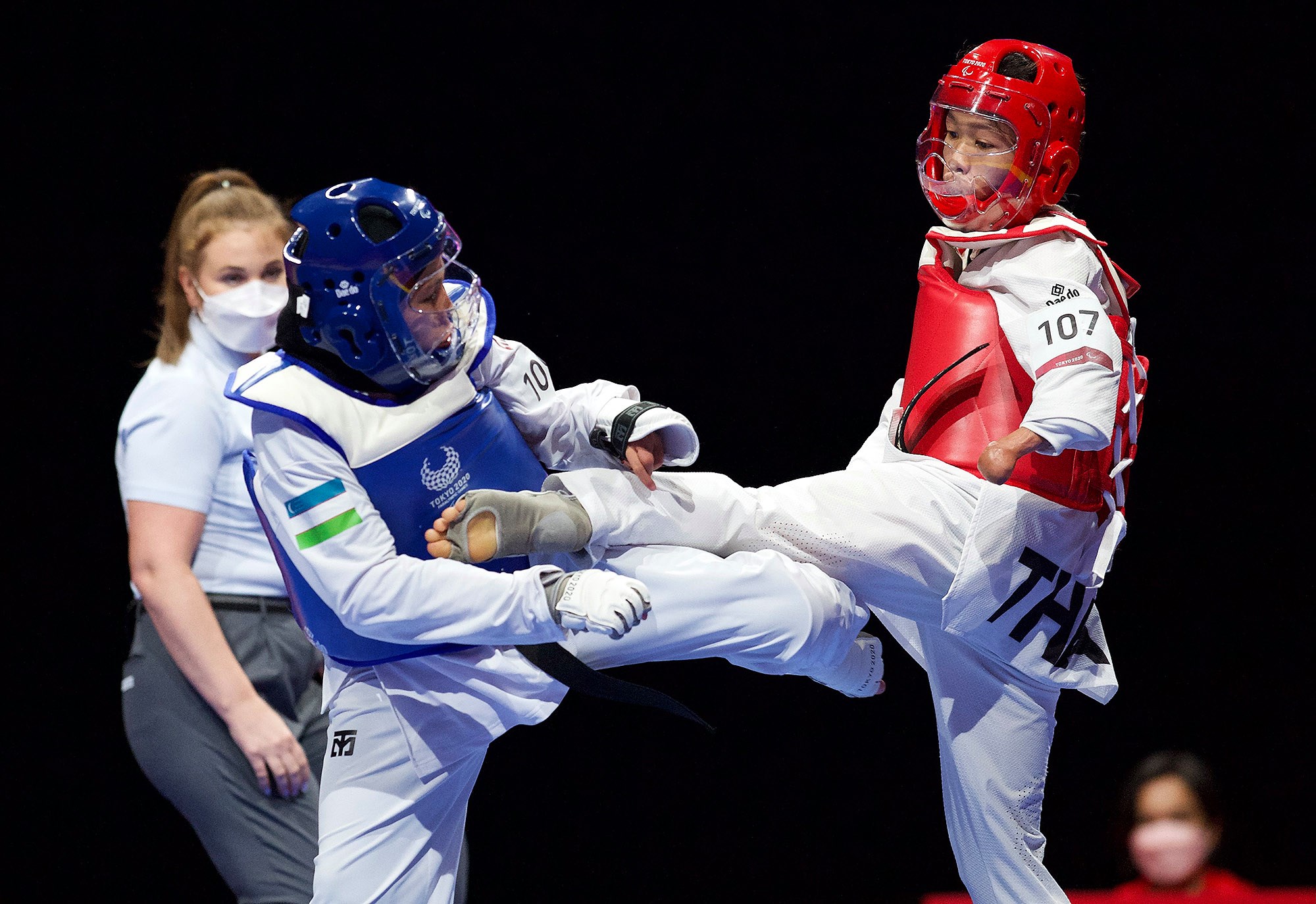
Khwansuda competing in the 2020 Paralympics
From the day she met Yeong Kyun Shin, Khwan’s teenage life was mostly training before and after school and on weekends. To progress, she moved to live with her coach. “My dad told me, ‘I am giving you to be a coach’s child’,” she explains. “But practice was rough. I kept asking myself, ‘why am I doing this? And for what?’ I wanted to quit so many times but my coach’s wife held me when I cried from tiredness. I felt like I was with family.”
September 2, 2021 would be Khwan’s day of glory in the para taekwondo K44-49 class. She beat the Azerbaijan fighter but lost to her Turkish opponent in the semifinals. Mustering all her strength, she returned in the repechage to beat fighters from Serbia and Mongolia and make it to the bronze medal match. In the biggest fight of her career to date, she easily beat Uzbekistan’s Zkyodakhon Isakova. Running around the arena in happy delirium, Khwan bumped fists with her opponent’s coach before rushing into Kyun Shin’s arms. The proud pair then ran around the ring, Thai flag aloft. “I was so happy. I thought it was only in my dreams that I would win a medal,” she smiles. “When my parents found out that I had won bronze, they just cried and cried and didn’t know what to say.”
While the Tokyo 2020 Olympics were shown on seven different channels and on the AIS Play app, no terrestrial channels broadcast the Paralympics, which were only available on AIS Play and T Sports. And while those two channels did show events such as wheelchair racing and some table tennis, not all sports that Thai para-athletes competed in were covered.
“Of course not having my event shown live on TV affected me but I’m not so sad about it. At least there were people viewing clips of me on social media afterwards,” Khwan says. “I believe in 2024 more TV channels will feature us, because now, for sure, everyone knows that the Paralympics are no lesser than the Olympics.”
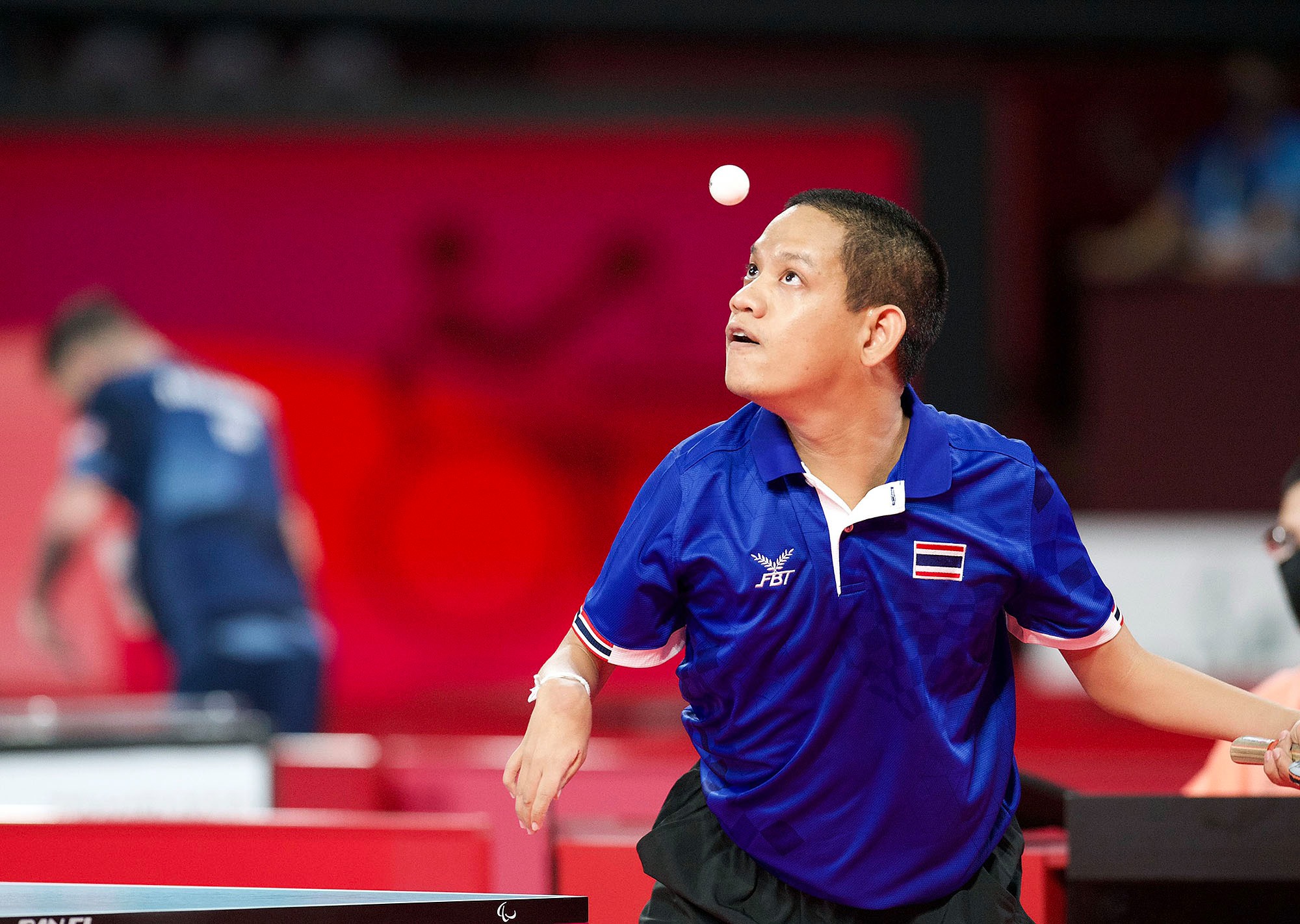
Rungroj Thainiyom concentrates on the ball in table tennis
Rungroj Thainiyom, bronze medalist in para table tennis, says he was grateful for any kind of coverage, even if it wasn’t live, and appreciated the billboards of him and fellow Paralympians around town. “In 2016 there were zero broadcasts, just family and a few journalists posting clips of us. I want to thank everyone who talked about us, for showing that we’re not a burden on society. On the contrary, as we demonstrated in Tokyo, we bring glory to the country.”
Rungroj, 34, was born prematurely with muscular dystrophy, a genetic disorder that resulted in his arms and legs being underdeveloped. He chose to go through rigorous physical therapy so he would not have to use a wheelchair but even then, he couldn’t keep up with his friends in football. So, he turned to table tennis.
“There’s a mantra I always repeat to myself: give something a try before telling yourself you can’t do it,” he says. And try he certainly has. In 2006, he won gold in para table tennis at the Asian Para Games. He competed at the Beijing Paralympics in 2008, won gold in London 2012 and then bronze in Rio in 2016. “When I got the gold medal in London pride was bursting from my chest and when we came home we were in a car procession and people were cheering for us. It made me believe that disabled people can do anything in society,” the sportsman says.
Winning bronze in the men’s singles class 6 in Tokyo, Rungroj bested opponents from Bosnia-Herzegovina, Germany and Romania before being defeated by Denmark’s Peter Rosenmeier in the semifinals. “We got these medals—five gold, five silver, eight bronze-but none of them came easy. The guys in wheelchair racing practised seven days a week, rain or shine, as the games approached,” he says with admiration. “The skin on their hands became as hard as their brake discs from pushing on those wheels. That’s commitment!”
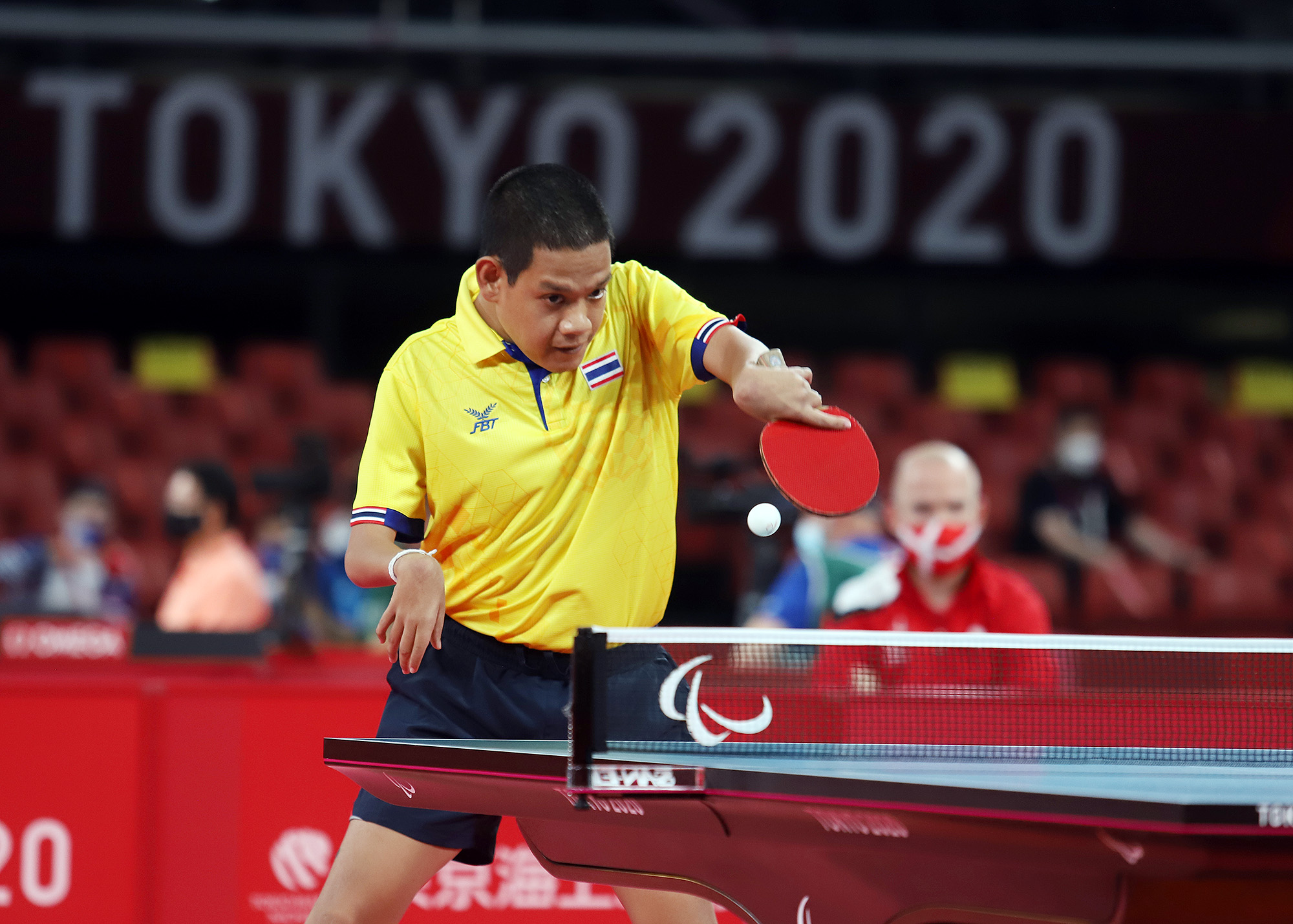
Rungroj has medalled in para table tennis in the last three Paralympics
When they returned to Thailand, Paralympians were paid less individual prize money for medals than Olympians—approximately 40 per cent less—which hardly seems fair. The National Sports Development Fund awards 12 million baht for an Olympics gold medal but just 7.2 million for one in the Paralympics. That’s the same amount as a silver medal for an Olympian, while a Paralympics silver earns 4.8 million. Again, that’s the same amount a bronze medalist in the Olympics gets, while a Paralympian bronze winner receives 3 million baht.
A post on Sport Retro Thai’s Facebook page highlighting the reward gap in the last few days of the Paralympics drew comments of outrage, with many expressing that since life for people with disabilities in Thailand can be so difficult, they should be afforded equal prize money or even more than able-bodied Olympians. Then in a surprising positive turn, almost a month after the games ended on September 29, the National Sports Development Fund approved a 100,000 baht cash prize both for Olympians and Paralympians who did not win medals at Tokyo 2020.
However, for Maitree and other para-athletes, even more urgent than the unequal prize money is the lack of welfare benefits for all the athletes, both those that win medals and those that don’t. “Equal prize money would be a good thing but only about 10 per cent of athletes succeed and get a medal,” he says. “Instead of just focusing on prize money, we need to take care of the rest by providing everyone with stable jobs and careers between the Paralympics, so they can take care of themselves and their families.”
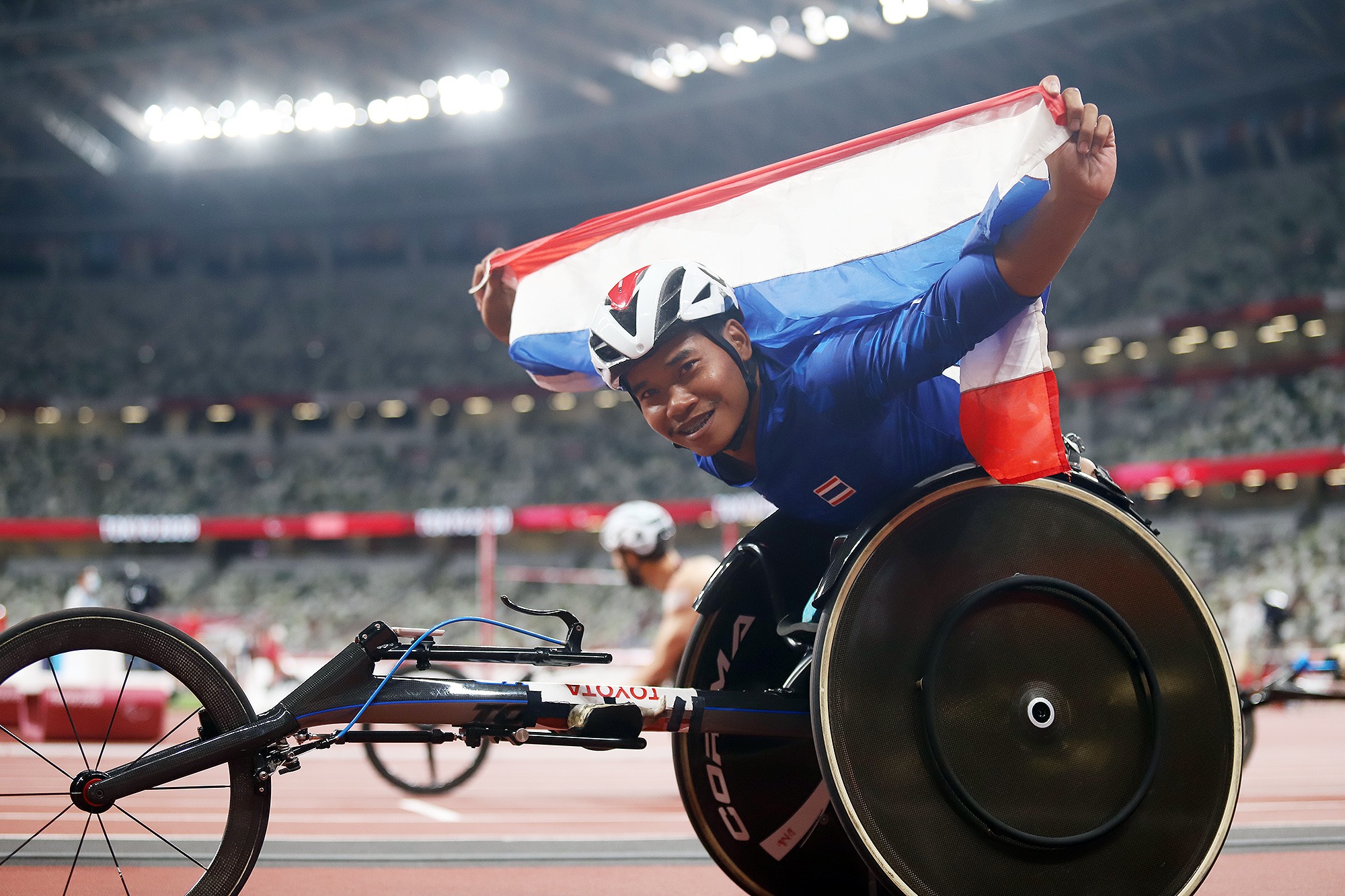
A jubilant Pongsakorn Paeyo after his win in wheelchair racing
Many Paralympians are employed by corporations including Singha Corp, Boonrawd Brewery, The Mall and Central Group. Companies are either sponsors of para-athletes or meeting a legal quota that requires them to hire at least one disabled person per every 100 employees. But with salaries typically under 15,000 baht a month, multiple gold medalists on the national team are being paid less than graduates fresh out of university.
Returning with or without a medal, the Thai para-athletes have to rely on their 30-baht universal welfare card to pay for any injuries sustained in training or while competing for their country. “Thais got to see our wheelchair racers on the international stage, not being wheeled into hospitals,” Maitree says. “But when they get injured and need to go to the hospital, the only benefits they receive are those on their disability card.”
In Thailand, people registered with disabilities are eligible for a monthly allowance of just 800 baht and their treatment in society is often unacceptable. A mindset deeply entrenched in Theravada Buddhism wrongly attributes an impaired body or mind to a karmic misdeed in a past life. People with disabilities are also often funnelled into low-grade menial roles such as busking or selling lottery tickets, if their families allow them to work at all. Many companies avoid the rule about hiring a disabled person per every 100 employees by paying into a state rehabilitation fund instead.
In addition, despite overcoming the odds to become the most successful Paralympians in ASEAN, Thai para-athletes are not given government positions or honourary military rank, which would ensure a more stable career. Contrast that with Tokyo 2020 taekwondo gold winner Panipak Wongpattanakit, who was awarded the rank of pilot officer in the Air Force, or boxing bronze medalist Sudaporn Seesondee, who became a sub-lieutenant in the Navy. “Wheelchair racer Pongsakorn Paeyo, currently our best para-athlete, has five gold medals but cannot be a police officer or a soldier, let alone a government official with any rank,” laments Maitree. That veteran wheelchair racer Prawat Wahoram, who has competed in every Paralympics since Sydney 2000, to claim a total of seven golds, eight silvers and a bronze—making him Thailand’s most decorated Paralympian—isn’t a household name in his own country is also frankly absurd.
In one of the more embarrassing show of inequality, the Para Post Facebook page, which promotes Thai Paralympians, wrote in early October about two Thai Paralympians, a man and a woman, who filed official complaints with the Sports Association for the Disabled of Thailand because they were provided with fake and defective Tokyo 2020 sports gear. “The male athlete was given counterfeit brand clothes and the organisers told him not to wear it while receiving his medal. This has created much sadness and humiliation,” the post said. “The female athlete received shoes to go to the Paralympics, but they fell apart on first use and she could not travel in them.”
The FESPIC 1999 games in Bangkok, a precursor of the Asian Para Games, was a major turning point in changing the Thai public’s view of disabled people. “Before, people saw us as a group that needed aid and charity. After, society began to see us for our skills and potential,” Maitree explains. “Sports for those with disabilities wasn’t just for health and rehabilitation but for excellence.”
“I believe in 2024 more TV channels will feature us, because now, for sure, everyone knows that the Paralympics are no lesser than the Olympics.”
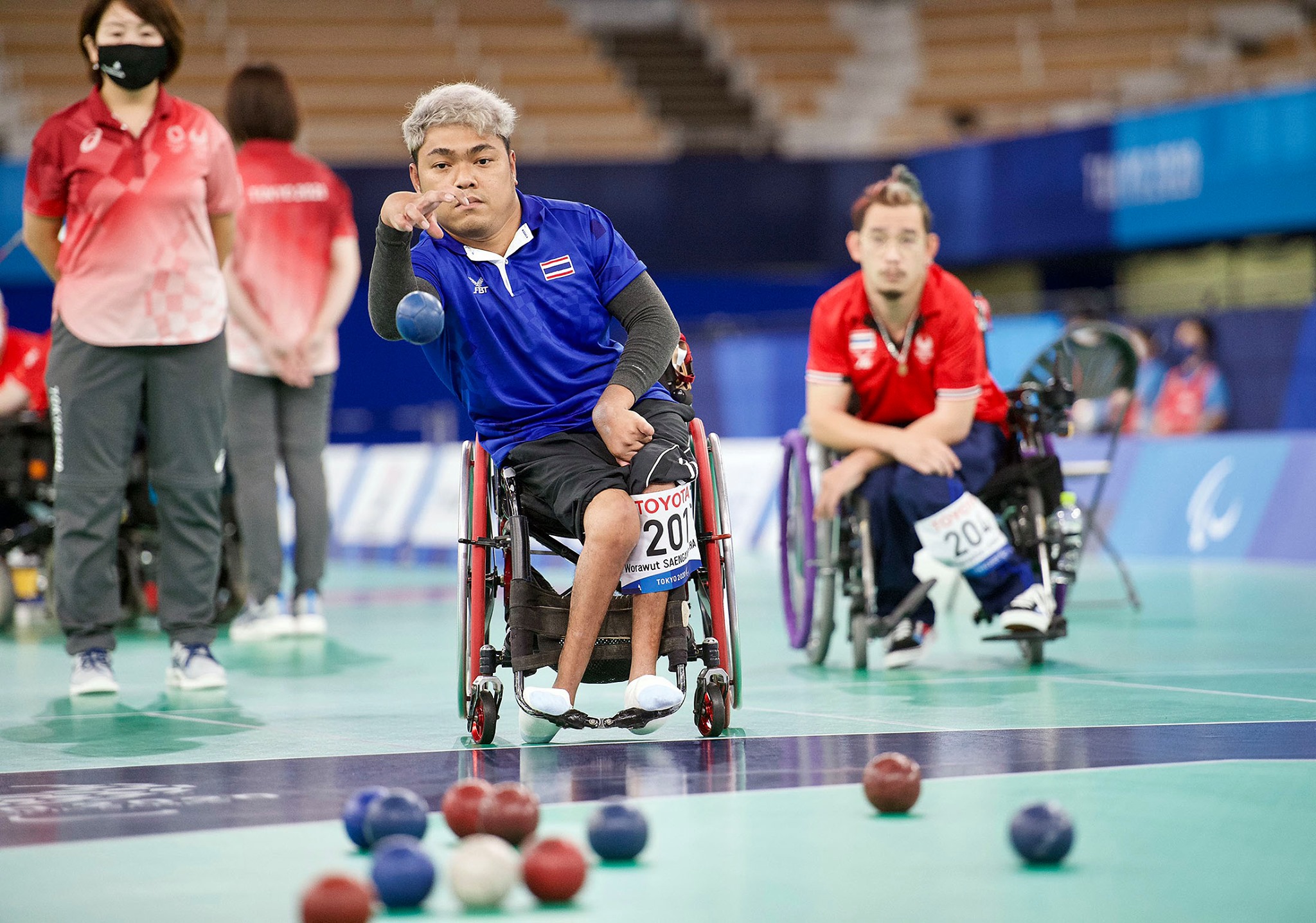
Worawut Saengampa won silver in the boccia individual event
BC1/BC2 boccia teammates Watcharaphon Vongsa, Witsanu Huadpradit, Worawut Saengampa and Subin Tipmanee battled their way to the gold medal final. In a sweat-soaked, hour-long match against China they were down 0-2 before bold tosses and precise throws pulled them ahead. They never looked back. Witsanu, who plays in the BC1 class and has severe activity limitations in his limbs and torso, delivered the final shot that secured an 8-2 win and sparked jubilation among his teammates. It was Thailand’s third consecutive Paralympics boccia title.
Many Thais who watched the final were overcome with emotion, despite not knowing the first thing about boccia. “Tears fell as I watched this match. You guys are so strong,” said one YouTube comment. “Watching this fills me with so much joy and respect,” said another. But perhaps the most touched was commenter Tanat Jarusinchai who wrote, “How can you guys be this skilled and spirited? Thank you for giving me the strength to keep on fighting. I love you from the bottom of my heart.”
Both Khwan and Rungroj are among the para-athletes planning to inspire once again at Paris 2024. “If I chose to give up, there would be no Rungroj who got gold in London 2012 and no Rungroj who won bronze in Tokyo. I consciously choose to get up and try again and again,” the athlete says. “In Paris, I will continue to try and make Thai people proud. I will try to bring home another medal.” Khwan also hopes that her example will inspire. “The Khwan of today and the child of my early life are as different as night and day. People around me haven’t just accepted me for who I am but also because I’ve become a role model. I say to people, look at me… sure life has been hard and full of setbacks but there is good luck as well. You just have to work for it.”
Get an exclusive peek into the world of Freen Sarocha: uncover 10 facts ...
In a cinematic landscape saturated with remakes, reboots and sequels, you might ...
While traditional TV shows are serving us endless boy-meets-girl tales. Thailand has ...
These top 5 barber shops in Bangkok are where gentlemen can elevate ...
Pets, as cherished members of our families, deserve rights and protections that ...
The internet makeup obsession straight out of Bangkok’s streets! Thai makeup zeroes ...
Wee use cookies to deliver your best experience on our website. By using our website, you consent to our cookies in accordance with our cookies policy and privacy policy